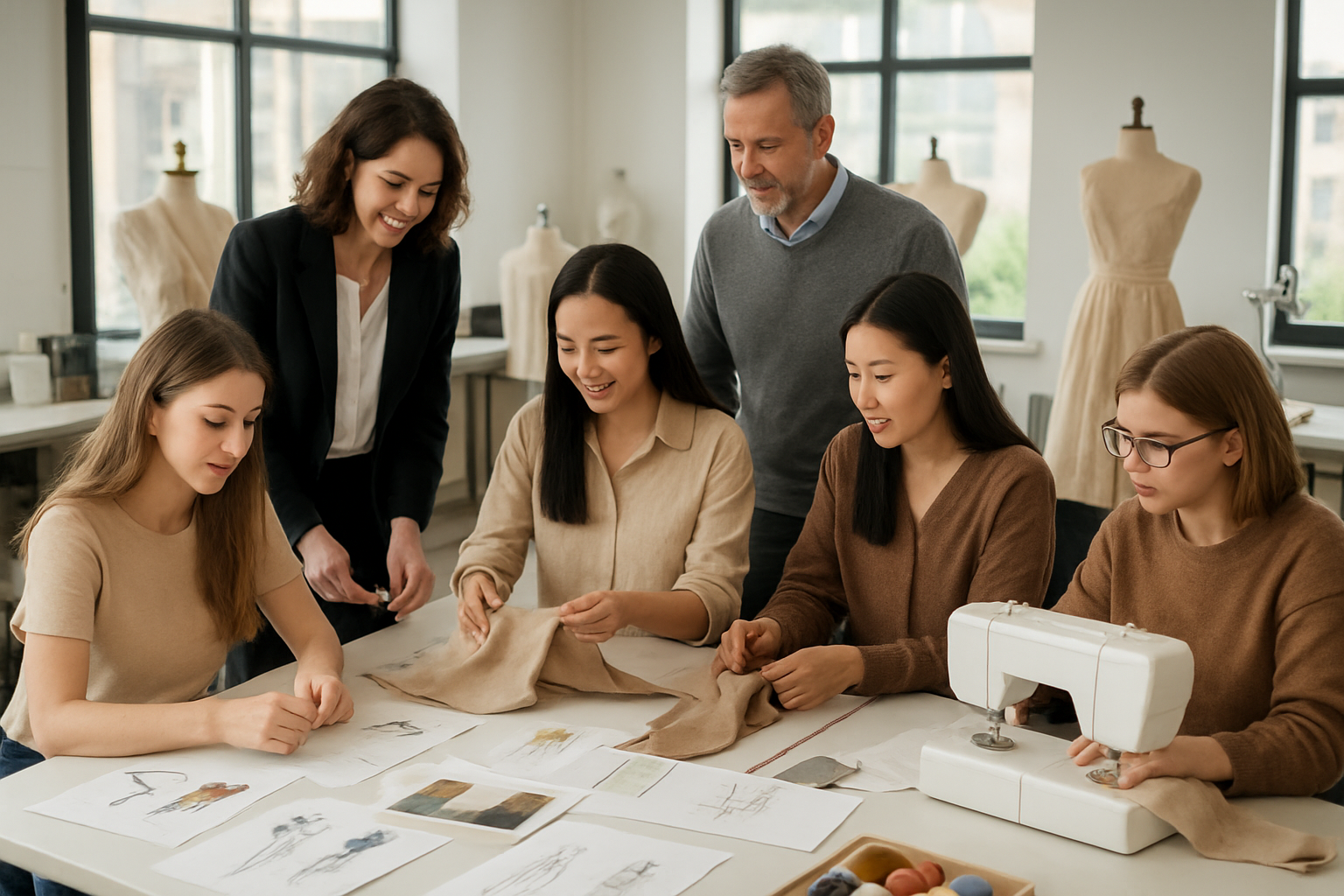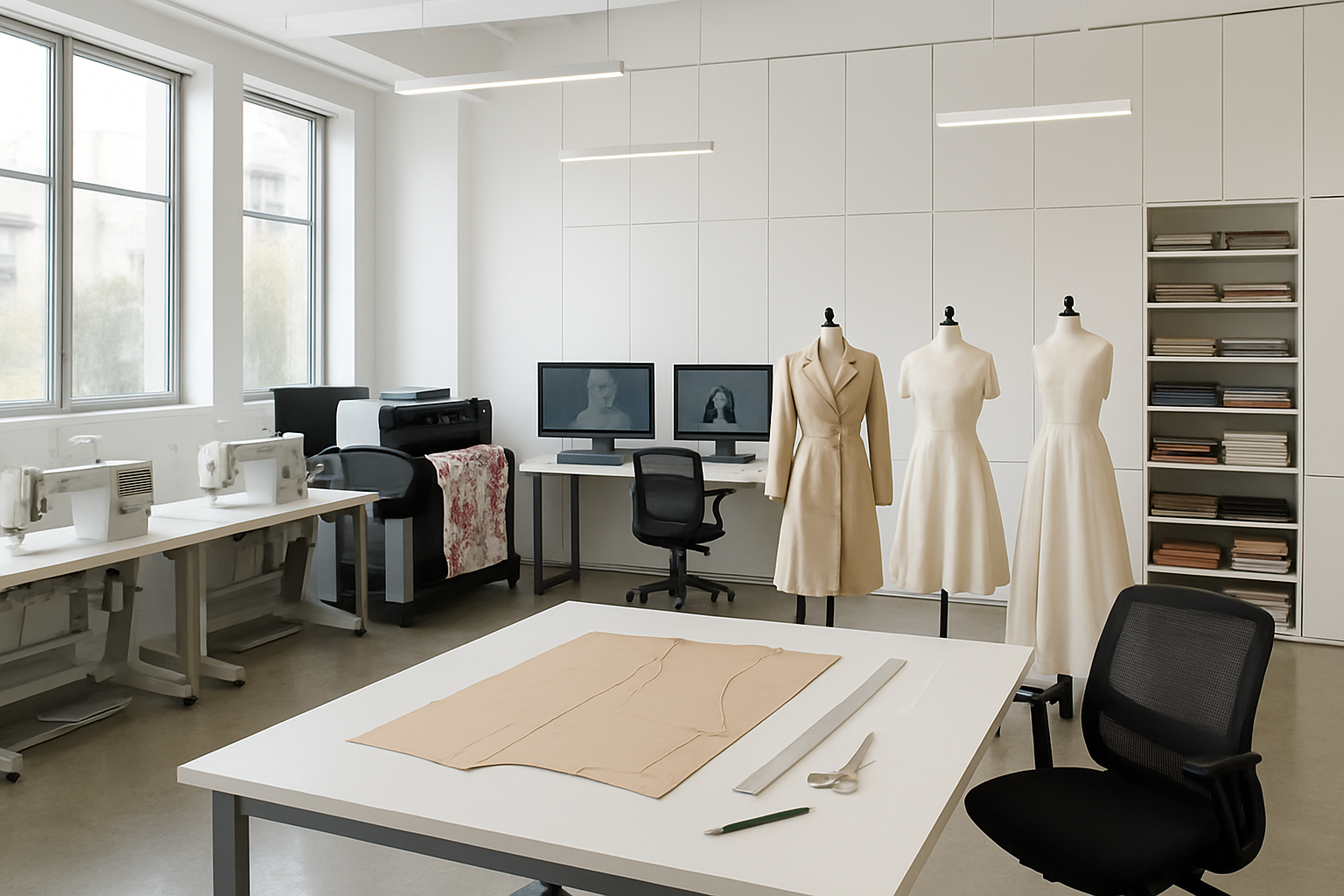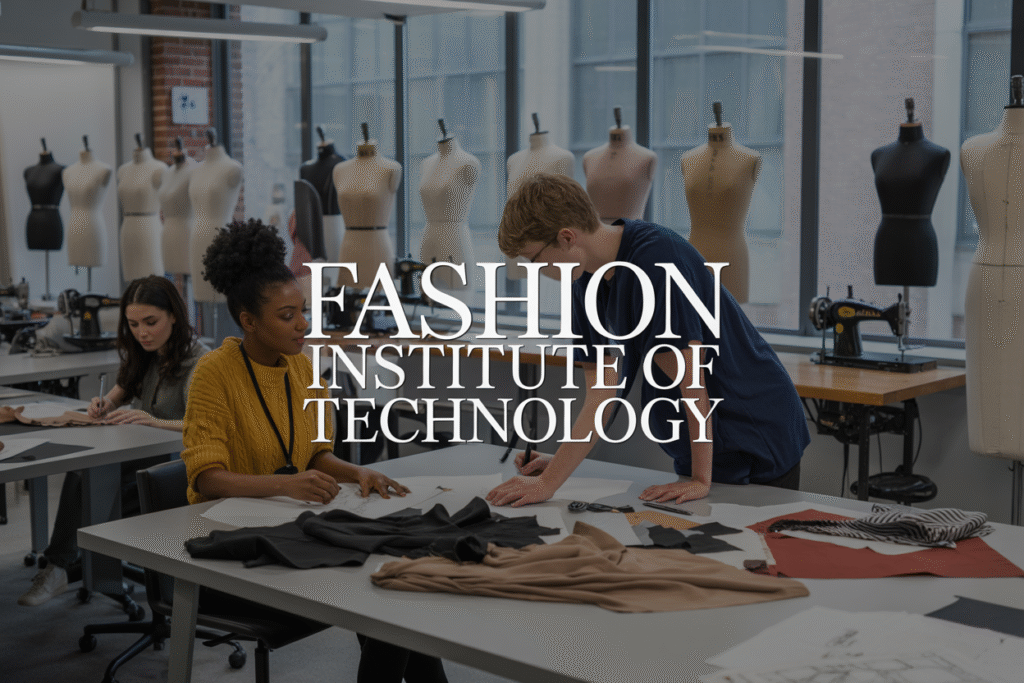The Fashion Institute of Technology stands as one of NYC’s premier destinations for aspiring fashion professionals ready to turn their creative dreams into successful careers. This guide is designed for high school graduates, career changers, and anyone passionate about breaking into the fashion industry through quality education and hands-on experience.
FIT fashion school offers more than just traditional classroom learning it’s a gateway to the dynamic world of fashion design education and industry connections. Students gain access to cutting-edge fashion design facilities while building the skills needed for today’s competitive fashion market.
We’ll explore how FIT’s specialized fashion design degree programs and fashion merchandising programs prepare students for real success. You’ll discover the school’s strong fashion industry partnerships that create genuine fashion career opportunities for graduates. We’ll also look at how these connections help position students for leadership roles in the global fashion market careers landscape.
Discover Your Creative Potential Through Specialized Fashion Education

Access Industry-Leading Faculty with Real-World Experience
The Fashion Institute of Technology brings together an exceptional faculty composed of industry veterans who’ve shaped the fashion landscape. These professors aren’t just academics—they’re former creative directors from major fashion houses, successful entrepreneurs who’ve launched their own brands, and seasoned professionals who’ve worked with top-tier retailers and manufacturers.
When you walk into a classroom at FIT fashion school, you’re learning directly from people who’ve navigated the real challenges of the fashion industry. Your professors understand the nuances of seasonal collections, the pressures of fast fashion timelines, and the creative problem-solving required to bring concepts from sketch to market. They share insider knowledge about industry standards, emerging trends, and the business realities that textbooks simply can’t capture.
This direct connection to the fashion world means your education stays current with rapidly evolving industry practices. Faculty members bring fresh perspectives from their ongoing professional work, ensuring that fashion design education at FIT reflects what’s actually happening in studios, showrooms, and retail environments right now.
Master Technical Skills Through Hands-On Studio Learning
Fashion design degree programs at FIT emphasize practical, hands-on learning that builds technical mastery alongside creative vision. Students spend significant time in specialized studios, working with professional-grade equipment and materials that mirror real industry environments.
The curriculum covers essential technical skills including:
- Pattern Making and Draping: Master the fundamental skills of creating patterns and draping techniques using industry-standard methods
- Digital Design Tools: Gain proficiency in Adobe Creative Suite, CAD software, and emerging digital design platforms
- Textile Knowledge: Develop deep understanding of fabric properties, sourcing, and sustainable material options
- Construction Techniques: Learn advanced sewing and finishing methods used in professional garment production
- Technical Illustration: Create precise technical drawings and specification sheets for production teams
Studio learning at FIT goes beyond basic skills. Students work on real projects that simulate industry deadlines and production constraints. This approach builds confidence in handling the technical demands of professional fashion work while developing the problem-solving abilities that successful designers need.
Build Professional Networks with Fashion Industry Connections
The Fashion Institute of Technology serves as a powerful networking hub where students connect with industry professionals, alumni, and peers who become lifelong collaborators. The school’s location in New York City places students at the heart of America’s fashion capital, creating natural opportunities for meaningful professional relationships.
FIT regularly hosts industry events, guest lectures, and portfolio reviews that bring working professionals directly to campus. These interactions often lead to internships, mentorship opportunities, and job placements. Alumni networks span across major fashion companies, luxury brands, and innovative startups, creating pathways for current students to enter competitive fashion career opportunities.
Student organizations and collaborative projects foster peer connections that prove valuable throughout professional careers. Many successful fashion partnerships begin as FIT friendships, with classmates eventually launching brands together or supporting each other’s ventures across different companies and markets.
Develop Your Unique Creative Voice and Artistic Vision
Fashion education at FIT encourages students to discover and develop their distinctive creative perspectives while building solid technical foundations. The program structure allows for personal exploration within professional frameworks, helping students identify their unique strengths and artistic interests.
Through diverse project assignments and critiques, students experiment with different design approaches and aesthetic directions. Whether drawn to avant-garde conceptual design, commercial ready-to-wear, sustainable fashion innovation, or cultural fashion expression, FIT provides the space and guidance to explore these interests deeply.
Faculty mentorship plays a crucial role in helping students refine their creative vision. Experienced professors recognize emerging talents and provide individualized guidance that helps students develop signature styles and approaches. This personalized attention ensures that graduates enter the fashion industry with both technical competence and a clear sense of their creative identity.
The program also emphasizes the importance of research and concept development, teaching students to ground their creative work in meaningful contexts and authentic inspiration sources.
Explore Diverse Career Paths in Fashion and Design

Launch Your Career in Fashion Design and Product Development
Fashion design careers extend far beyond sketching beautiful clothes. At Fashion Institute of Technology, students dive into technical design, pattern making, and product development that bridges creativity with commercial viability. The fashion design education here covers everything from concept to consumer, teaching you how to develop cohesive collections that speak to target markets.
Product development roles are particularly exciting because you get to see ideas come to life. You’ll work with manufacturers, source materials, and solve technical challenges that turn sketches into sellable garments. Many FIT fashion school graduates find themselves as design assistants at major brands, where they learn the fast-paced world of seasonal collections and trend forecasting.
Excel in Fashion Business Management and Merchandising
The business side of fashion offers incredible opportunities for those who love both style and strategy. Fashion merchandising programs at FIT prepare you for roles as buyers, planners, and retail managers. These professionals decide what products hit store shelves and how they’re positioned to customers.
Visual merchandising is another exciting path where creativity meets commerce. You’ll design store layouts, window displays, and brand experiences that draw customers in and drive sales. Many graduates start as assistant buyers at department stores or work their way up through brand management roles.
Fashion business managers oversee everything from production timelines to marketing budgets. They’re the ones making sure fashion companies run smoothly and profitably.
Enter the World of Fashion Marketing and Communications
Digital marketing has transformed how fashion brands connect with consumers. Social media managers, content creators, and brand strategists are in high demand as companies compete for attention online. FIT’s programs teach you how to build compelling brand narratives and reach audiences through various channels.
Public relations specialists handle media relationships, organize fashion shows, and manage brand reputation. Fashion journalists and stylists also play crucial roles in shaping trends and consumer perceptions.
E-commerce has opened new doors too. Online merchandisers, digital marketing specialists, and customer experience managers help brands succeed in the digital marketplace.
Pursue Specialized Fields Like Textile Development and Styling
The fashion industry needs specialists who understand the technical side of garments. Textile developers work with new materials, sustainable fabrics, and innovative production methods. These roles combine science with creativity as you help brands develop unique fabrics that meet specific performance requirements.
Fashion styling offers another creative outlet where you can work with photographers, celebrities, or retail brands to create compelling visual stories. Personal stylists help individuals develop their personal brand, while commercial stylists work on advertising campaigns and editorial shoots.
Other specialized fashion career opportunities include fashion forecasting, where trend analysts predict what consumers will want seasons ahead, and fashion technology roles that focus on wearable tech and digital fashion innovations.
Gain Real-World Experience Through Industry Partnerships

Secure Prestigious Internships with Top Fashion Brands
FIT fashion school maintains strong connections with fashion powerhouses like Marc Jacobs, Ralph Lauren, Coach, and Calvin Klein, giving students direct access to coveted internship positions. These partnerships aren’t just name-dropping – they represent real opportunities for students to work alongside industry professionals during their studies.
The career services team actively matches students with internships based on their specific interests and career goals. Whether you’re passionate about sustainable fashion, luxury retail, or emerging streetwear brands, FIT’s network spans the entire fashion ecosystem. Students regularly secure positions at Vogue, Harper’s Bazaar, Bergdorf Goodman, and Saks Fifth Avenue, gaining insider knowledge of how the fashion industry actually operates.
What sets these internships apart is their integration with academic coursework. Students don’t just fetch coffee – they contribute to real projects, attend design meetings, and participate in product development cycles. Many internships lead to full-time job offers, with employers recognizing the caliber of FIT graduates.
Participate in New York Fashion Week Student Showcases
Being located in fashion’s epicenter gives FIT students unprecedented access to New York Fashion Week events and showcases. The school regularly organizes student presentations during Fashion Week, allowing emerging designers to display their work alongside established industry names.
These showcases attract buyers, fashion editors, and talent scouts who actively seek fresh perspectives and innovative designs. Students gain experience in every aspect of a fashion show, from concept development and styling to production management and media relations.
The exposure extends beyond the runway. Fashion Week participation connects students with photographers, models, makeup artists, and other creative professionals, building networks that prove invaluable throughout their careers. Many FIT alumni credit their Fashion Week experiences as pivotal moments that launched their professional journeys.
Collaborate on Live Projects with Industry Partners
FIT’s industry partnerships go beyond traditional internships through collaborative project work that addresses real business challenges. Students work directly with companies like Nike, Adidas, and Target on product development initiatives, sustainability projects, and market research studies.
These collaborations mirror actual workplace dynamics, complete with deadlines, client presentations, and budget constraints. Students might develop a capsule collection for a retail partner, create marketing campaigns for fashion brands, or design sustainable packaging solutions. The projects often result in implemented products or strategies, giving students tangible proof of their professional capabilities.
Faculty members, many of whom maintain active industry roles, facilitate these partnerships and ensure projects align with current market trends and business needs. This approach bridges the gap between academic learning and professional practice, preparing students for immediate success in fashion industry careers.
Access State-of-the-Art Facilities and Resources

Work in Professional-Grade Design Studios and Labs
The Fashion Institute of Technology provides students with access to industry-standard design studios that mirror the professional environments they’ll encounter after graduation. These spaces feature cutting-edge equipment including computerized pattern-making systems, industrial sewing machines, and specialized textile testing equipment. Fashion design students work alongside peers in spacious, well-lit studios equipped with professional dress forms, pattern tables, and fabric storage systems that create an authentic industry atmosphere.
The textile design labs house sophisticated equipment for screen printing, digital fabric printing, and fiber manipulation. Students learn on the same machinery used by major fashion houses, giving them hands-on experience with commercial-grade dyeing equipment and fabric finishing processes. The knitwear design lab features both hand and machine knitting equipment, including electronic knitting machines that allow students to create complex patterns and textures.
Use Advanced Technology for Digital Design and Manufacturing
FIT fashion school integrates cutting-edge digital technology throughout its curriculum, preparing students for the increasingly tech-driven fashion industry. Students work with professional software including Adobe Creative Suite, CLO 3D for virtual garment design, and Gerber AccuMark for pattern-making and grading. These digital tools allow designers to visualize garments before physical construction, reducing waste and accelerating the design process.
The school’s 3D printing facilities enable students to experiment with innovative accessories, jewelry, and even textile structures. Digital embroidery machines and laser cutting equipment provide precision manufacturing capabilities that match industry standards. Students also access virtual reality systems for immersive fashion presentations and augmented reality tools for retail applications.
Access Comprehensive Fashion Libraries and Research Centers
The Gladys Marcus Library serves as one of the world’s most extensive fashion research facilities, housing over 300,000 books, periodicals, and digital resources focused on fashion, textiles, and design. The collection includes rare fashion publications, historical pattern books, and exclusive industry reports that provide invaluable research opportunities for students and faculty.
The Special Collections and College Archives contain unique materials including original sketches from renowned designers, vintage fashion photographs, and textile samples spanning centuries of fashion history. Students conducting research for their fashion design degree programs can access digital databases featuring fashion forecasting reports, trend analysis, and global market data that inform their design decisions and business strategies.
Benefit from On-Campus Museum and Gallery Exhibitions
The Museum at FIT showcases rotating exhibitions featuring everything from haute couture to streetwear, providing students with constant exposure to exceptional design work. These professionally curated exhibitions often include pieces from major fashion houses, emerging designers, and historical collections that illustrate the evolution of fashion design education and industry practices.
Gallery spaces throughout the campus display student work alongside professional exhibitions, creating an inspiring environment that encourages creative excellence. Students regularly attend opening receptions, curator talks, and educational programs that connect them with fashion industry professionals and visiting artists. This exposure to world-class fashion exhibitions enhances their visual literacy and design sensibilities while building networks within the fashion community.
Position Yourself for Success in the Global Fashion Market

Build an Impressive Portfolio That Stands Out to Employers
Your portfolio becomes your visual resume in the competitive global fashion market, and Fashion Institute of Technology helps you create something that makes employers stop scrolling and take notice. The school’s curriculum pushes students to develop diverse projects that showcase both technical skills and creative vision, giving you pieces that demonstrate your versatility across different fashion disciplines.
What makes FIT portfolios special is their focus on real industry applications. Students work on commercial briefs that mirror actual client projects, creating work that feels authentic to potential employers. You’ll develop everything from technical flat drawings and construction details to mood boards and trend forecasting presentations. The faculty, many of whom are active industry professionals, provide feedback that mirrors what you’ll hear in actual job interviews.
Digital presentation skills receive equal attention to creative development. You’ll learn to curate your work for different audiences – whether you’re applying to luxury fashion houses, fast fashion retailers, or emerging sustainable brands. The school teaches students how to tell their design story through their portfolio, helping employers understand not just what you can create, but how you think and problem-solve.
Many graduates report that their FIT portfolios opened doors to interviews at major fashion companies, with recruiters specifically commenting on the professional quality and industry relevance of their work.
Develop Leadership Skills Through Student Organizations
Student organizations at FIT serve as training grounds for the leadership skills that fashion industry executives value most. These groups mirror the collaborative, fast-paced environment you’ll encounter in fashion careers, giving you practical experience managing teams, budgets, and creative projects before you graduate.
The Fashion Business Society, Fashion Show Production team, and various design clubs offer opportunities to lead major events that attract industry attention. Students who take on executive roles learn to coordinate with vendors, manage production timelines, and handle the pressure that comes with high-stakes fashion events. These experiences translate directly to skills needed in fashion merchandising programs and design roles.
Club leadership also develops your ability to work across different fashion specialties. As president of a student organization, you might coordinate with fashion design degree programs, merchandising students, and business majors to create cohesive events or initiatives. This cross-functional collaboration mirrors what you’ll do as a team leader in fashion industry partnerships.
The school’s location in NYC means student organizations regularly collaborate with fashion companies and attend industry events. Leaders of these groups often find themselves networking with professionals who later become mentors or offer internship opportunities, creating direct pathways into fashion career opportunities.
Connect with Alumni Network Across Fashion Industry Giants
FIT’s alumni network spans virtually every major player in the global fashion market careers landscape, from luxury conglomerates to innovative startups. The school’s graduates hold influential positions at companies like Marc Jacobs, Calvin Klein, Michael Kors, and emerging direct-to-consumer brands that are reshaping how fashion reaches consumers.
The Alumni Association actively facilitates connections between current students and working professionals through mentorship programs, portfolio reviews, and industry panels. These aren’t just brief networking events – they’re sustained relationships that help students understand different career paths and make informed decisions about their specializations within fashion design education.
What’s particularly valuable is how alumni share real insights about working in different segments of the fashion industry. A graduate working in sustainable fashion offers different perspectives than someone in luxury retail buying, and FIT students get access to both viewpoints. This diversity of experience helps students position themselves strategically as they enter the job market.
The network also provides ongoing career support after graduation. Alumni frequently share job openings, collaborate on projects, and offer guidance as fashion professionals navigate career changes or advancement opportunities. This creates a supportive ecosystem that extends well beyond the typical four-year college experience, giving FIT graduates lasting advantages in building their fashion careers.

FIT offers an unmatched foundation for anyone serious about breaking into the fashion world. From specialized programs that unlock your creative abilities to hands-on experience with industry leaders, the institute connects students directly to the opportunities that matter most. The combination of cutting-edge facilities, diverse career pathways, and real-world partnerships creates an environment where fashion dreams can actually become successful careers.
Your journey in fashion starts with choosing the right education, and FIT positions you at the center of one of the world’s most dynamic industries. If you’re ready to turn your passion for fashion into a thriving career, exploring what FIT has to offer could be the game-changing decision you’ve been looking for. The global fashion market is waiting for fresh talent – make sure you’re prepared to meet it head-on.


2 Comments
bulgaria holiday destinations The tour exceeded all our expectations. https://linktr.ee/travelshopbookings
mexico tours packages Ava K. The balloon flight was calm and quiet — you could hear birds singing above the valley. https://emittistanbul.com/tr/exhibitor-188395-2025.info